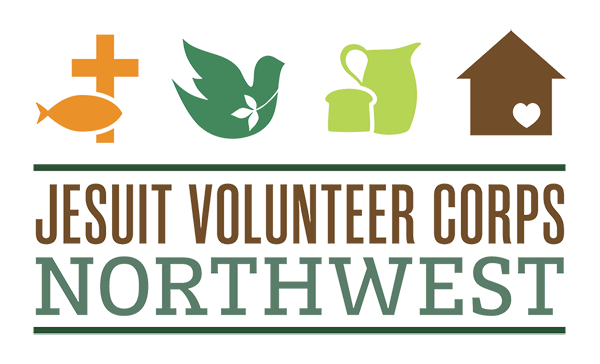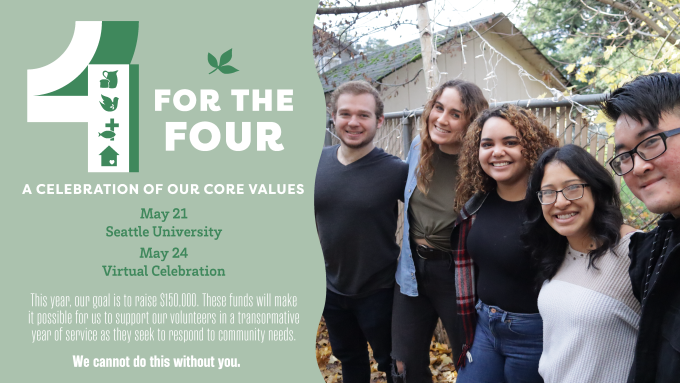JV AmeriCorps member Mary Franz (Boise, ID ’16-17) serves as the Registered Nurse and Outreach Coordinator with Terry Reilly in Boise, Idaho. In our latest AmeriCorps blog, Mary shares her experience discovering the type of nurse she wants to be as she is called to serve, to heal, to advocate, to listen, and to love.
The expectations surrounding a new nurse involve being initiated via night shifts, charting every move you make, and being “devoured” by your elders. There is also the notion that the only “real nurses” are those that work in critical care. This is the standard by which nurses judge each other and are judged in turn. In fact, when you graduate from nursing school, everyone asks you the same question: “Which unit do you want to work on?”

Trying to answer this question throughout my last semester of college, I always found my responses insufficient for two reasons: 1. Not all nurses work on a hospital unit. 2. Nurses do not work for any particular hospital or unit, they serve patients. Service is at the very foundation of who we are as a profession. We are called to serve, to heal, to advocate, to listen, and to love. Those actions are not limited to the hospital; we can accomplish them anywhere.
In resistance to this narrow question, I would ask, “What if I don’t want to be a hospital nurse? What if no unit particularly peaks my interest? What if I don’t want to work the night shift?!”
Hush, you’re a new graduate. You have to gain experience and pay your dues. No one will want to hire you if you haven’t spent time in the hospital.
These pressures from the nursing world were almost too strong to oppose when I graduated last May. My heart screamed “RESIST!” as I scanned the job openings page on the websites for big-name hospitals and medical research centers. Those were the only destinations I could see at the end of the wooded path forged by the new-grad nurses before me, with the lumbering walls of trees on either side asking, “What unit do you want to work on?”
“RESIST!” my heart persisted. I listened. Last May, I stood at the entrance of that path and defiantly turned the other way.
“You’re going to be a volunteer?” questioned onlookers as I packed my bag to become a nurse at a small clinic in Idaho. The idea that I would turn down a hospital position, job stability, and a $50,000/year pay check made me a radical. As a matter of fact, “radical” was exactly the title I wanted to hold when I joined the nursing profession.
Maneuvering through nursing school, I quickly became aware of the enormous injustices in the healthcare system. I saw patients spin through the revolving door of the psychiatric unit and individuals experiencing homelessness sent away into the glacial cold. I witnessed the poor and the vulnerable receive substandard care once providers discovered they arrived without insurance. I interacted with nurses who had become jaded by the flawed systems in place; they no longer felt like they had the power to make change.
In the midst of these ongoing challenges, I found the warm embrace of Public Health. Reading Tracy Kidder’s Mountains Beyond Mountains early on in my education, I was swept away by the radical love of Dr. Paul Farmer:
If you say that seven hours is too long to walk for two families of patients, you’re saying that their lives matter less than some others’, and the idea that some lives matter less is the root of all that is wrong with the world.

It’s a radical notion to walk even an hour to visit a patient. It’s radical to resist the benefits of a hospital nursing position. It’s radical to think that a nurse can be more than just a bedside caregiver. As I stood in awe of revolutionaries like Farmer, I became more aware of the nurse I wanted to be. I wanted to be a radical. I wanted to be a resistor. I wanted to work for social justice, not a paycheck. Naturally, those desires led me to be a volunteer.
Today, I serve as a public health nurse through the Jesuit Volunteer Corps Northwest AmeriCorps Program at a non-profit, Terry Reilly, which provides access to affordable health care for vulnerable and marginalized people in Boise and surrounding cities. As a JV AmeriCorps member, I serve a variety of community members including immigrants, refugees, homeless, and low-income families. The majority of my patients do not have health insurance and are receiving primary health care from our organization at a significantly discounted rate.
In comparing my time in the hospital and in the community, I’ve noticed distinct differences in my role as a caregiver. As a public health nurse, I create visions for the long-term health of patients and communities. My goal is not to stabilize or to discharge. It is to empower individuals and communities to make meaningful change and give them the tools and the resources to do so. With this goal, I face extreme challenges because the patients and populations I serve experience disadvantage in ways I am still discovering.
In the United States, gaps in the federally-funded healthcare insurance system and lack of access to affordable private coverage for the working poor have left millions of residents, citizens and non-citizens, without access to health care. When individuals don’t have access to or can’t afford quality health care, many preventable chronic and life-threatening illnesses go undiagnosed and untreated.
“RESIST!” my heart continues screaming. But how do I respond?

For me, these last few months have transformed the word “resistance.” It now suggests something resilient and enduring instead of stubborn and short-lived. I am inspired by the ongoing efforts to resist decisions that disregard the dignity of each individual, that treat healthcare as a commodity and not a human right. It’s not enough that my service as a public health nurse opposes the tradition of new-grad nurses entering the hospital. It ultimately needs to respond in resistance to oppressions and injustices facing vulnerable populations. I must remember to not only undo the damage that prejudiced systems perpetuate, but to build something simultaneously. I have to join the collective counter force of both public health and hospital nurses who are serving, healing, listening, and advocating in the midst of uncertainty. I must continue to love.
Real love is radical because it cannot be earned or unearned. It is connected to inherent dignity – to the idea that everyone matters equally. It is invincible because it is determined to thrive no matter what walls are in place, no matter what scarcity demagogues design, no matter what fear they try to sow. Radical love must persist at the center of a nurse’s resistance. It is the driving force to which we accept the night shift, pay our dues, and become a volunteer. Radical love for our patients, our service and commitment to them despite all opposition, distinguishes our profession.
So, what if we asked different questions of new-grad nurses? What if, instead of pushing them to the hospital, we asked, “Which patient population do you want to serve?” Along with this question, what if we challenged new-grad nurses to consider the type of nurse they want to be? “Will you be a resistor? Will you be a radical?” But most importantly, in moments when patients feel hopeless and afflicted, when forces of injustice seem almost too strong, “How will you show love?”


Mary, you are my kind of nurse. It will be nurses like you who will make dramatic changes in our “healthcare” System.
I was a JVC in the early 70s. Served in Pendleton, Portland and Seattle. I just recently retired from a 50+ year career in Nursing. I looked for underserved populations, then wrote my job description and submitted to Administration AND got job each time. I was never the one to follow rules just because “that’s the way we always do it” I challenged the norm throughout my Nursing career.
I am now a certified Fearless Living Coach to nurses and caregivers. I help the helpers find new freedom through a program called Tools to navigate life and caregiving without losing yourself.
Mary, keep questioning the norm and move the pendulum back towards compassion and Loving caregiving.